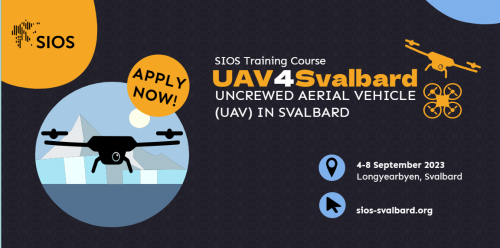In autumn 2023 SIOS held a training course on how to effectively use UAVs for research in Svalbard. The training was delivered by UAV experts from SIOS member institutions, international researchers, and experts from industry. The goal of the course was to teach participants the basic skills needed to use UAVs in Svalbard.
- Time: 4 - 8 September 2023
- Location: Longyearbyen, Svalbard
- Recordings: Not available
COURSE PROGRAMME
- 4 September 2023
-
Introduction
Richard Hann (NTNU)Photogrammetry workflow
Richard Hann (NTNU)Photogrammetry workflow (hands-on)
Clare Webster (University of Oslo)Photogrammetry - image alignment (hands-on)
- 5 September 2023
-
Practical aspects of flying/regulations
Richard Hann (NTNU)Flight planning and fieldwork
Richard Hann (NTNU)Georeferencing
Clare Webster (University of Oslo)Photogrammetry - control and check points (hands-on)
- 6 September 2023
-
Excursion to Endalen
Photogrammetry - dense clouds, DEM generation, orthomosaics (hands-on)
Photogrammetry - data analysis (hands-on)
- 7 September 2023
-
Non-RGB data acquisition
Clare Webster (University of Oslo)Student projects - Independent work on project
- 8 September 2023
-
Student project presentations
GENERAL COURSE INFORMATION
- Target audience
-
The course was intended for scientists, master/Ph.D. students and technicians with modest or no experience with UAVs in their research, preferably those who had not used UAVs before.
- Course objectives
-
General objectives
Due to the relatively fast and easy data acquisition, low cost and high data resolution, UAVs have become a popular instrument in environmental studies. SIOS member institutions use drones in a range of research projects across Svalbard. However, scientists may lack the necessary training required to fly drones and/or process the data. PhD students from SIOS member institutions who are about to begin careers can especially benefit from this training course.
This course will consist of following activities:
- Theoretical lecture series
- Hands-on, demo and practice sessions
- Field excursion and social events
- Mini-projects
Learning objectives
At the conclusion of the educational activities (4-8 September 2023) and the following mini-projects:
- you should achieve basic/beginner’s understanding of the applicability of UAVs in Svalbard/Arctic research.
- you should develop knowledge and understanding of how drones and associated datasets can benefit your research.
- you should be able to plan your own drone-based fieldwork in Svalbard and arctic environments.
- you should be able to use SfM methods for post-processing images to create 3D data products.
- you should be able to safely conduct drone flights within the applicable regulations in Svalbard.
- you should know of more sophisticated methods of drone usage.
- you should be able to demonstrate understanding of potential advanced applications of drone technologies to Arctic research questions.
- you should develop the knowledge/expertise to carry out your own drone-based field campaigns.
- you should develop mini-projects or pilot applications using UAV data.
- Lecturers
-
- Richard Hann (NTNU - Norwegian University of Science and Technology)
- Clare Webster (University of Oslo)
- Peter Betlem (The University Centre in Svalbard)
- Task force
-
This training course is organised by a task force comprised of the following members:
- Richard Hann (NTNU)
- Clare Webster (University of Oslo)
- William Harcourt (Aberdeen University)
- Sara Aparício (Solenix for ESA/NOVA University of Lisbon)
- Zuzanna Swirad (IG-PAS)
- Shridhar Jawak (SIOS-KC)




























